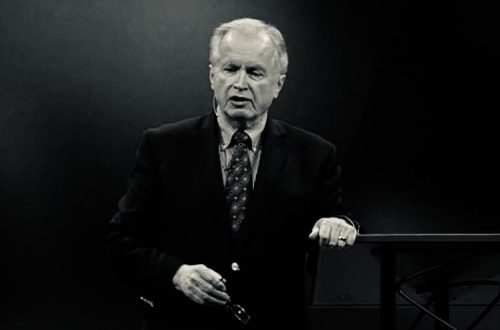Mark Dever has an informal dialog with Jim Wallis about the church’s responsibility to promote social justice. This video is part 1 of the conversation, and there are more videos to follow.
As you might expect, Dever and Wallis markedly differ about the role “justice” ought to have in gospel ministry. This section of the conversation is about race relations. Dever’s point is that the church as the church should not confuse its mandate to preach the gospel with social justice concerns. Wallis argues that that gospel ministry includes efforts at racial reconciliation in the wider culture.
What I find most interesting about this first segment is the differing ways that these two men come at this question. At the end of the video, Mark presses Wallis on the meaning of Ephesians 3 and its bearing on the issue. Wallis never addresses the text. Dever addresses the scripture as the normative basis for answering the question. Wallis goes elsewhere.
Christianity Today‘s leadership blog hosted this conversation. Keep your eyes peeled for the rest of the interview at www.outofur.com.
(HT: @TimmyBrister)




15 Comments
Paula
Wallis: “We don’t make the world Christian but we ought to make the world a better place.”
Well, technically, true…it’s God’s work to “make” someone a Christian, not ours. But I suspect that’s not what Wallis was getting at. I think it’s a good summary of the Christian left’s mission.
It’s a shame Wallis didn’t interact with what Dever actually said about the difference between an individual Christian’s role in society and what the church can/should/ought to do. He just launched right into his apologetic for the Christian left’s agenda as if he hadn’t heard a word Dever said.
Daniel Doleys
Dr. Burk,
I think Pastor Dever hit the nail on the head here. Paul’s call for racial reconciliation in Eph (and Rom and Gal for that matter) is based on the creation of a new race, the inaugurated eschatological new humanity of those who trust in Christ. The Church pursues racial reconciliation by calling people to a Gospel whose outcome is a new humanity founded in the resurrected Christ.
Yet, we also view any sort of racism as contrary to Biblical truth because all humanity is made in the image of God. What then is the difference between actively pursuing policy and social change to stop abortion, which is also grounded on the fact that all people are image bearers, and pursuing the same avenues for racial reconciliation. If both abortion and racism are sinful based on the Biblical truth of the image of God, should we not pursue legal statutes against both equally?
I would enjoy hearing your thoughts on this matter. Thanks!
Kyle
Thanks for posting this, Denny.
Kelly
The fact that this is even being debated by conservative evangelicals in 2010 is amazing.
Charlie
Yeah, the church/world distinction is a problem for Wallis’ view. Even the Galatians passage he referenced is dealing with our inheritance in being in union with Christ. Something that cannot be duplicated in the world.
And I am not swayed by Wallis’ appeals to the polices in the past. He appealed to past issues like slavery and civil rights and then identified certain polices to say the church did or should have backed those. If the church would have understood her role to social justice she would have (or in the case of Wilberforce did) follow through on the correct response.
However, it is easy to see things looking backwards in time to something like slave trade. But the hard issue is the one facing us in the here and now. It is simple to say, “the way slavery was ended was the right way to do it back in the day and the church should have been for that policy. Because we can look backward and see that it worked. It is easy for Wallis to look back in history and say, “the way Martin Luther King Jr. solved the civil rights issue was the right way” because we can look back on it and agree. But when there is a issue today and there are several answers on the table the “church’s position” is a lot less clear. How do we deal with poverty? There are many answers to that question. We don’t have the benefit to be reading a history text book in the year 2097 which tells us “such and such policy proved to be the most successful.” We can’t do that. That is why it is easy to bond the church with a specific policy when looking at the past. We see what worked. But in the here and now it is a lot tougher.
That is why I am not swayed with Wallis’ arguments from the past. The battles of “which polices work” are much tougher in the here and now. Thus, to appeal like that to the past is to cloud the issue. If we knew what worked, no problem we would just hop right on board. The problem is that we are working through what is the most biblical and thorough way to deal with the issues. And the answers are not always that clear.
John
I like Dever’s distinction between the individual in society, and the church body in society. I believe many evangelicals have lost the distinctions and distinctives of the church, which has led to some confusion. Dever seems to be embracing a (now very rare) idea of personal charity.
Chris
Kelly I think this is being debated because what is being called social justice by many Christians has nothing to do with biblical justice.
Social justice assumes that humans have rights. Biblical justice tells us we have no human rights!
Social justice tells us that our goal should be equality of status based on equality of economics, human rights and equality of earthly opportunities. Biblical justice calls us only to equality of status (status being our sinful nature in need of divine redemption).
So whats really surprising here in 2010 is that many still do not understand the biblical concept of justice or reject it and instead create a human concept of justice.
BPRJam
I’m not sure that Biblical justice tells us that we have no human rights, but rather we are made in the image of God and therefore are deserving of a certain kind of justice from each other.
We can debate what that justice looks like, but I’m not sure the need for “divine” redemption necessarily excludes human action in the world. In fact, I think an argument can be made that they are sometimes the same thing.
Chris
BPRJam I admit my understanding may be incomplete. What rights do you believe the bible gives us?
Certainly we are called to love one another, even our enemies, but I don’t see how that relates to justice. Perhaps this is all splitting hairs over terminology….
When I speak of divine redemption I am speaking of the gospel. No human intervention (aside from the fact that Jesus was fully human) can overcome our sin. The danger comes when we think WE bring redemption through our actions. We don’t. We show mercy and compassion with our actions but certainly not justice. Perhaps once again it’s the terminology that’s tripping us up.
Nathan
Chris, I see a biblical idea of justice that you’ve overlooked, the 2nd greatest command: love your neighbor as yourself.
I think Christians forget this command and think their only responsiblity is to recite Romans road.
BPRJam
I’m struggling with where to start, because the categories we use today like “rights” and “justice” don’t always match with the usage of them in Biblical times. I’ll give this a shot, but it will incomplete; this is a blog comment after all. (Oh, and I haven’t been able to watch the Wallis/Dever debate yet.)
First, I would say that Biblically, people have a “right” to not be oppressed, and the people of God have the responsibility to care for the oppressed. The Bible doesn’t use the term “right”, but the people of Israel and later Christians were reminded to both not oppress and to take care of the oppressed often (e.g., caring for the widow, orphan, alien, those oppressed through shady business dealings, those murdered, etc.). I read this “right” as being rooted in shared identity – because the people of God are always orphans who are adopted, aliens who were oppressed, slaves to sin, made in the image of God, etc. That’s why whatever we do to the least of these, we do to Jesus – we share a common humanity that links us all to each other and to God.
Second, I may be reading “gospel” and “good news” differently than some others. I came to faith in a tradition that believed the “Roman Road” was the good news. That the good news was that God provided a way to become forgiven from our sin and to get to heaven. But as I’ve read the Bible and other’s thoughts, I now believe that the good news is that the Kingdom of God is breaking into creation through the children of God, and includes the justice of God for those who have been oppressed. Both Matthew’s and Luke’s version of the beatitudes reflect this in a nutshell, as does James and John (especially 1 John 3). In other words, I believe that one who reduces the gospel to simply spiritual concerns misses the point. The Gospel – the ushering in of the Kingdom of God – is intensely spiritual and physical.
That means redemption and repentance are spiritual and physical. Luke 3:7-18 has John the Baptist telling people to repent, and telling people how they can prepare to enter the Kingdom of God. In response the people ask what they should do (presumably to repent). John’s response is “share your possessions”, “don’t extort money”, “be content with your pay”, and more. I believe that the people who want to find themselves in the kingdom of God need to be doing the same things – creating a place where God’s will (including his justice) is done on earth as it is in heaven.
That’s not to say that I think it can happen under human power – it can’t. There is no justice or righteousness or salvation without God. I, as a fallen creature cannot offer salvation. But if I’m found in Christ, as his brother, following His commands, participating in the body and the blood of Christ (1 Corinthians 10:16), I can say “what I have, I give you” (Acts 3:6), and it includes care for the needy, justice for the oppressed, and salvation for the lost. The ultimate fulfillment of these things may be far off (i.e., not yet), but the good news of the kingdom of God should be among us to a lesser extent already.
Two final things. One – a reminder that this is an incomplete argument and there are many holes I left open. It would take at least a blog series to adequately explore the Biblical evidence for what I espouse. Probably more like a book. Two – I don’t nearly have all this figured out. Not by a long shot. I do believe, though, that we as Christians give up on the idea of “There were no needy persons among them.” (Acts 4:34) way too easily. Yes, I know this verse applies to the community of believers, but as one who strives to love my enemies, and prays for God’s will to be done on earth as it is in heaven, I want it to apply to everyone else as well.
Chris – how you you view the gospel?
BPRJam
Dang, that comment was WAY longer than intended. My apologies.
Chris
Nathan I think that justice and rights are different than biblical commands! I am trying to stick with biblical definitions because it gets very confusing otherwise. That being said I agree with you!
BPRJam thanks for the well thought out post! I am sure mine will not be so well though out!
Once again “right” is the wrong word I believe and using it brings confusion. Also I think we are using “justice” incorrectly too! They sound good and are great buzz words but if we use them, we need to use them in a biblically correct way.
We lost our “rights” in the Garden and justice requires that we die! God in His infinite love and mercy satisfied His justice through Christ so that we can be saved. Once we have The Holy Spirit in control of our life we then will live a life of love, mercy and compassion that demonstrate themselves through our actions. We feed the poor, clothe the needy, care for the widows, etc….
That’s what I consider the gospel.
Now what does it mean to love, be merciful etc…?
Love = love like God loved us sacrificially
Mercy = sparing from judgment or harm.
Compassion = sympathetic consciousness of others’ distress along with a desire to alleviate it.
These are things that are a part of us once Christ is involved. Now certainly people of other faiths or no faith show love, mercy and compassion.
Therefore what is the difference between Christian love, mercy and compassion and the worlds love, mercy and compassion?
I think if we can answer that question we are closer to clarity!
Charlton Connett
Chris,
Permit me to wade into the argument, please. As to the question you asked BPRJam, “What rights do we have?” I submit to you the Old Testament laws, and the 10 Commandments. In each case the qualification of what is wrong indicates that there is also a “right” that comes along with the law. For instance: in the law of inheritance, passing the land from one generation to the next, there is an implicit right of ownership, such that to take the land of one person, without just recompense, would deprive that person of their rights.
Similarly with the commandments not to steal and not to covet. There is a human right to have ownership of our possessions. That means that no government on earth can ever act morally when it takes from someone what is rightfully that person’s property. Of course, how a government determines what is rightfully someone’s property may vary from society to society. In Egypt 20% of the crop belonged to Pharaoh in perpetuity after the events of Joseph’s life. But, if Pharaoh demanded 21% of the crop, without just cause, then he would be acting immorally by violating the rights of his people.
The rights we have are only before men though, which is where I think you are correct when you assert that we gave up our rights in the Garden of Eden. Before God man is guilty, a law breaker, and as such we cannot argue that God is wrong to do whatever he wants to us. Second to that, as part of God’s creation, we are his possession (cf. Paul’s discussion on the potter and the clay). Therefore, God does not violate our rights, and we are wrong to think we can claim any rights at all before God, unless we are in Christ. In Christ we enjoy privileges, or private rights (consider the etymology of “privilege” privi-lege = private law, thus a right unique to an individual, or certain individuals).
In Christ we have a right to come before God in prayer. We have a right to expect mercy from God when we stand before him. We have a right to be empowered by the Holy Spirit. However, we do not need “claim” these rights because they are a gift from God, according to his grace. Equally, a minister has a “right” be supported by those he ministers to, though some, like Paul, choose to give up that right for the sake of the gospel.
But, all of this aside, the discussion between Dever and Wallis is not on whether there are certain moral standards which the church ought to endorse, (I.e.: Slavery is bad, murder is wrong, theft is wicked) but on whether the church should ever endorse a certain program because of its goals. Should churches endorse medicare and medicaid because those programs seek to care for the sick, or should the church simply encourage its members to take personal responsibility to care for the sick and remain silent on programs such as medicare and medicaid? Should a church oppose medicare and medicaid because it is a government intervention into the private responsibilities of citizens?
Wallis seems to say that churches should take position on social programs, and endorse good social programs. Dever stated early on that the church should endorse the idea of social justice, and encourage members to be just and to work for justice, but should not take a position on programs, as different individuals may have different ideas on how to achieve the same goal. Which of the two is right?
Derek
Kelly,
Are you implying that Christians are compelled to accept Jim Wallis’ perspective on social justice in order to be a faithful or compassionate Christian?
FWIW, I think it is important to point out that Christians who favor Mark Dever’s position are more involved in charitable work/contributions than their liberal counterparts. I would go as far as to argue that if a Christian really does care about social justice, they will find the most effective vehicles for service in a church that follows Dever’s approach. Those who doubt me should really check out the findings of a major research project/study, detailed in the book “Who Really Cares?”, by Arthur Brooks.